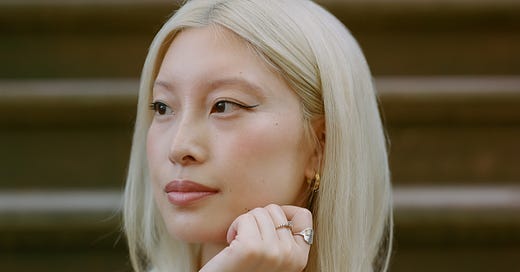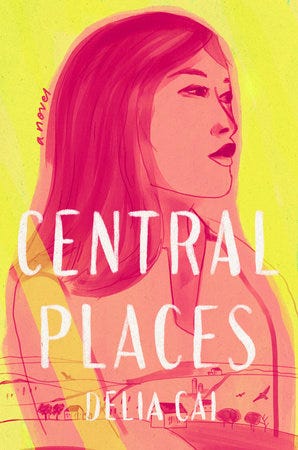Dive Bars, the Newsletter to Novel Pipeline, and Going Back to Your Hometown with Delia Cai
A Q&A with the author of Central Places
Delia Cai is the reason you’re reading this newsletter on Substack. She told me about the platform in spring 2018, when it was still very new, introduced me to one of the founders (hi, Hamish) and I migrated my newsletter over a few weeks later. We met through mutual friends in 2017 and have been through a lot of twenty something milestones together, from breakups to new jobs, new apartments, and new creative journeys. In addition to being my friend and a newsletter pro, Delia is a correspondent at Vanity Fair and the author of Central Places, her debut novel. I’m excited to share our conversation about Central Places, writing while having a full time job, and letting characters (and yourself) be messy, especially in your twenties. The book came out this week and you can grab a copy here and follow Delia on Instagram (check out her book’s IG too) and Twitter.
Abigail: Can you introduce yourself and tell us a little bit about Central Places?
Delia: I am a midwestern transplant living in New York, and Central Places is my Joker origin story. The novel is about a 27-year-old Chinese-American woman who grew up in central Illinois and moved to the city (like me), but (unlike me) she is bringing her fiancé home for the holidays to visit. It's a book I wrote to answer a few life hypotheticals, but mostly it's me making my peace with the way I grew up.
Abigail: Food is a big part of the book—Audrey and Ben get off their flight and go straight to HMart with her dad and the dive bars are home to some key scenes. How did you choose the food and restaurants featured in the book and what do they add to it?
Delia: I feel like there's this tradition with Asian-American identity storytelling where food plays a huge role, and it's always sooo delicious and sooo amazing. Don't get me wrong, I love reading that kind of stuff, but sometimes I think it's a little gratuitous because believe me, growing up in a Chinese household did not mean we had these authentic culinary experiences for every meal. So I wanted to draw attention to like, the normal foods and places that were a part of growing up—the H Mart runs that were so freaking boring to go on as a kid, the dive bar that was one of the three bars you could drink at in town. Back then, those things were not something to romanticize! I definitely do some romanticizing in the novel now, of course, but I want people to love those places for how ordinary they are, too.
Abigail: The book captures that time in your late twenties where some people are buying property and some are nowhere close to that and looking at Zillow recreationally. Audrey is in the middle of that, with a very rich fiancé. What made you want to explore that dynamic (it's so relatable)?
Delia: Central Places is a novel about going back to your hometown, and so the theme of "what is home, really" was a huge question on my mind. (And just in general, as someone also in my late twenties). When you're wrestling with finding your place in the world, being able to buy property becomes this huge, literal symbol. I think the reason that anxiety looms so large for our generation particularly is this almost evolutionary fear, where you're wondering: is there a place for me?
Abigail: Let's talk about newsletters and the newsletter to novel pipeline—you're the first person who told me about Substack. Tell us about Deez Links and how the newsletter helped you create and sell this novel.
Delia: Oh man. I started my newsletter back in 2016 because I was so envious of friends who were already getting published left and right, and I didn't feel like I had any opportunities like that! So I started Deez Links just to have an outlet to be funny and try to figure out like, what my voice was, and what I cared about, and whether I could actually get myself to form opinions and write something every day. That turned out to be really great training for working in media but also for writing a novel, because my newsletter days sort of taught me like, it's not that serious. Like, you're just writing a TinyLetter or a Substack for your 20 friends, who cares if it's bad, just do it! Which turns out to be a pretty instructive ethos to go into writing a novel, because most of the mental agony of it is this pressure that it might not be any good. But I got very lucky with the newsletter and wound up with a really lovely, supportive audience along the way, and that definitely doesn't hurt to have your own email marketing campaign list when you need to sell the book years later.
Abigail: Do you have any advice for people balancing a day job, which for you also involves writing, and working on a novel or other writing project?
Keep reading with a 7-day free trial
Subscribe to This Needs Hot Sauce to keep reading this post and get 7 days of free access to the full post archives.




